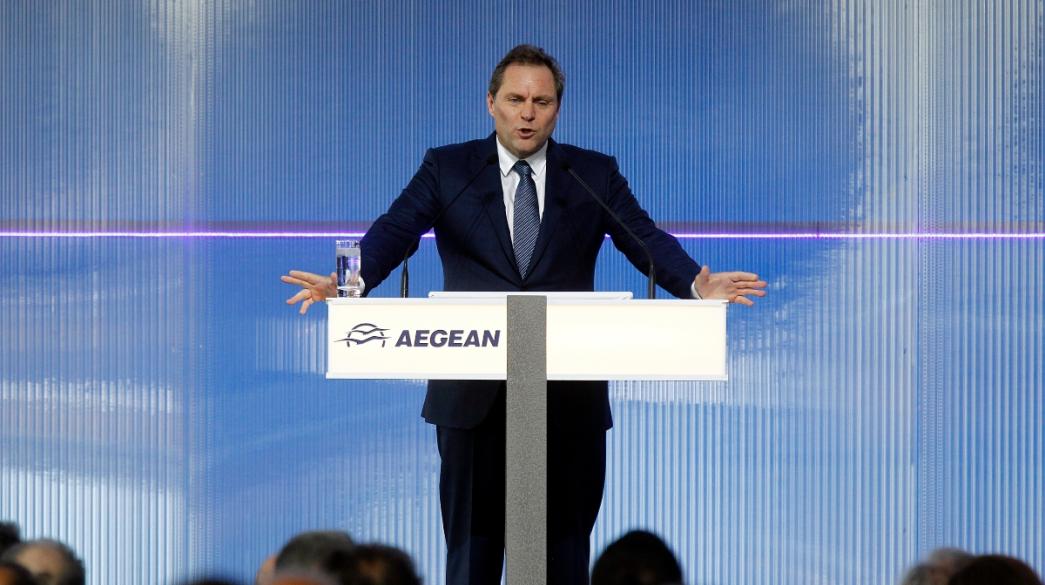Aegean Airlines and the Greek government have ruled out a state rescue plan for the airline that would partial nationalization and the European Commission having a say in matters, after announcements made yesterday, however many questions about the company's mid-term course remain unanswered, such as: will the support, in the form of government guarantees on lending, be enough to avoid a reduction in capacity as of 2021?
For the time being, market concerns about Aegean's progress during this difficult period seem to be waning. This is reflected in the price of the company's bond, which is traded on the ATHEX, and rose 2.67 percent yesterday to 93, a big distance from 54.7, which it had dipped to on March 18 when concerns peaked about the impact of the pandemic. Until the beginning of March, the bond was trading above par (100), with a 52-week high of 107,199.
The horizon for the company is clearing up after yesterday's announcements on government support measures for airliners, totaling 115 million euros, of which Aegean will benegit the most as the industry's leading company. This package seems too small to support Aegean, but it is combined with measures to boost liquidity, which is the most important step: the company plans to ask from the country's four systemic banks for loans with government guarantees totaling 150 million euros, amounting to 11 percent of its turnover.
The combination of these measures and the liquidity Aegean already has, which exceeds 500 million euros, according to the company's management, seems to offer significant support during this difficult period as the company burns through its liquidity. In the second quarter of this year, these losses were estimated to reach 40 million euros a month, as the return to flight normalcy will be very slow. In September, the company expects to reach 45- 50 percent of the business it did last year.
Hidden benefit
A benefit for Aegean from the support measures is that they will not need to be cleared by the European Commission's Directorate-General for Competition (DG Comp), as is the case with Lufthansa. If the Greek state provided funds to the airline, in exchange for any tool that would lead to its direct or indirect participation in its capital (shares, common or privileged, convertible bonds) the cost for Aegean would be much lower than the state-backed loans, but the move would be strictly assessed by DG Comp, as lawyers specializing in European competition law point out to Business Daily.
Legal experts say that it is likely DG Comp would have asked Aegean, as a condition for approving the state support, reforms much more painful than those demanded of Lufthansa, which resulted in the temporary freezing of its rescue plan. This is because Aegean, moreso than Lufthansa, dominates Greece's domestic flights market and has a very high share of the country's international flights. Additionally, it has an agreement with Airbus (which is being renegotiated) regarding the significant expansion and modernization of its fleet.
In terms of competition law, lawyers say, it would be unthinkable for the Commission to allow the state to offer unconditional funds to Aegean, allowing it to maintain its dominant position, while also funding the expansion of its fleet. With structural measures, the commission would have forced Aegean to provide more room to competitors, as is the case with Lufthansa, which is being called upon by the Commission to hand over valuable slots at two of Germany's largest airports. Essentially, through this process, Aegean's market share would be reduced, with a serious impact on its pricing policy, due to the increased competition.
Although Aegean is taking a significant breather and avoiding getting mixed up with the commission, a serious question about the company's future has yet to be answered. Will these support measures be enough to prevent it from shrinking in the new pandemic environment?
Aegean president Eftychis Vasilakis had recently made it clear to analysts that there are two future scenarios faced by the company as of 2021: it will either receive sufficient support from the state to maintain its full potential, or it will rely on its own resources and will be obliged to reduce operations to 75 percent as of 2021.
Company sources told Business Daily that it is too early to make conclusions about the company's future capacity. Analysts note that support through guaranteed loans is a significant boost, but it is not at all certain that the company will be able to maintain all of its routes in 2021. Additionally, much will be determined by negotiations with Airbus on the new aircraft. Without a relatively favorable agreement on the delivery schedule and reduction in payments, Aegean will be under intense pressure, especially if the effects of the pandemic in air transport prove to be long-lasting.





